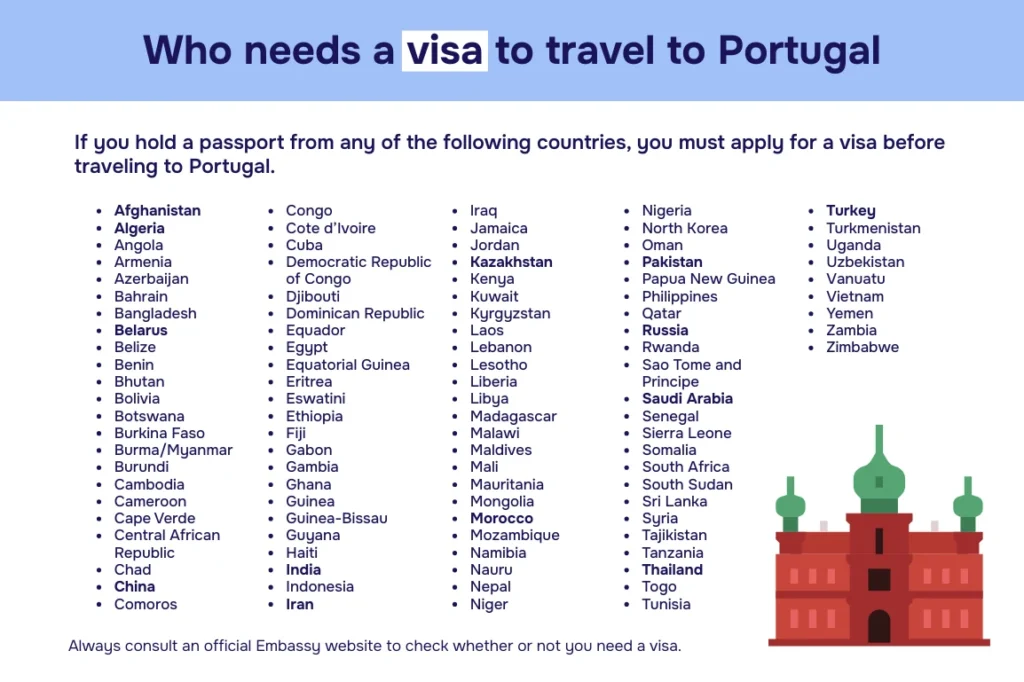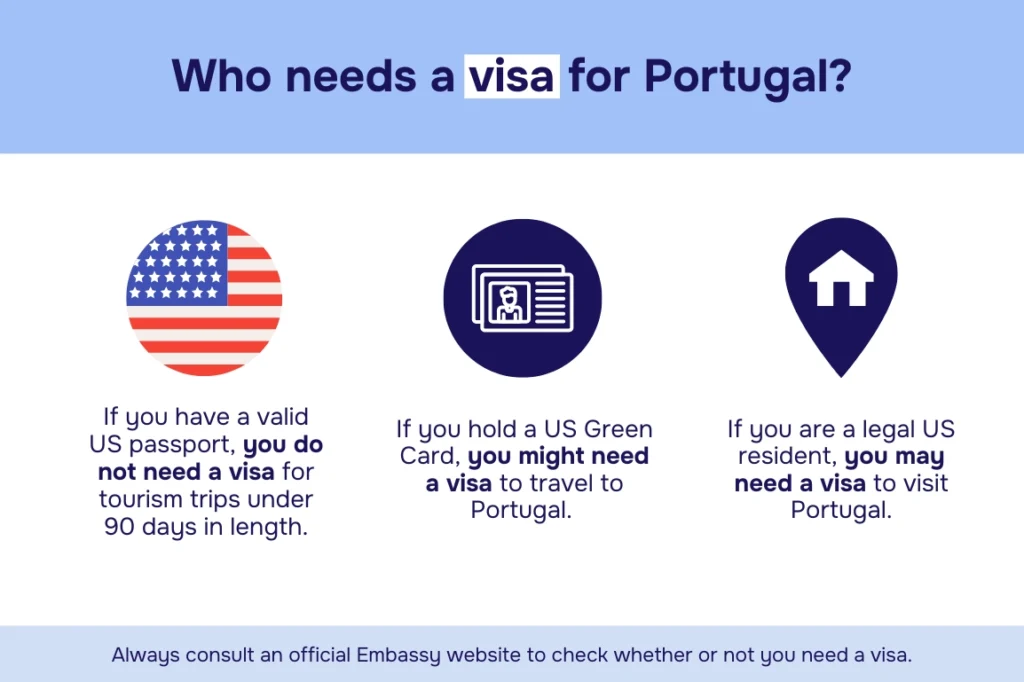Home > The Portugal Visa Process: A Guide for Travelers

The Portugal Visa Process: A Guide for Travelers
If you’re planning a trip to Portugal, whether it’s for a weeklong sunny getaway, to visit a friend, or to attend a conference, it’s important to know whether or not you need a visa to enter the country.
If you're planning to head to Portugal, whether it's just for a short sunny getaway, to visit a friend, or attend a conference, there are a few things you have to know to make that trip a reality.
One of those things: a visa.
While some travelers don't need a visa to travel to Portugal, others do. Whether or not you need one depends on a few different things. Then, there is the whole question of how to even apply.
In this article, we’ll break down everything you need to know about Portugal visas – from whether or not you need one to how to apply.

Do I need a visa to go to Portugal?
Whether or not you need a visa to go to Portugal depends on:
- Your nationality
- How long you want to stay in Portugal
- The purpose of your trip
Some countries have visa-waiver agreements with the Schengen zone (which Portugal is a part of).
That means that citizens of those countries don’t need visas for short stays (up to 90 days) for business or tourism/visiting. If you’re a citizen of the US, UK, Canada, Australia, or a handful of other countries, you do not need a visa for short stays in Portugal.
However, for longer stays or specific reasons, you’ll need to apply for the correct type of visa.
Not all countries have this type of agreement, which means their citizens will need a visa regardless of the reason for their travel or the duration of the trip. These countries include China, India, South Africa, and others.

Do US citizens need a visa for Portugal?
US citizens don’t need a visa for short trips to Portugal – so long as the trip is max up to 90 days within a 180-day period.
That doesn't mean you have a carte blanche, though. There are certain scenarios where Americans have to get a visa, such as to work, study, or spend longer amounts of time in the country.
How long can you stay in Portugal without a visa?
US citizens can stay in Portugal for up to 90 days without a visa. Any longer, and a visa is required. Keep in mind that the 90-day rule applies to any given 180-day period. This means that you can stay in Portugal for up to 90 days, but then you will need to leave Portugal (and the entire Schengen area) for another 90 days before you can return.

How to apply for a visa for Portugal
Applying for a visa can definitely seem intimidating, but it’s a fairly straightforward process. Especially if you understand a little bit about the process before going in.
The first step is figuring out which visa type fits your needs.
If you’re a tourist and need a visa, you'll likely need a Portugal tourist visa. If you’re planning to work, a Portugal work visa is necessary. You can apply at a Portuguese consulate or visa center in your country of residence.
The steps are typically as follows:
- Determine which Portugal visa you need.
- Collect all of the required documents (your visa center or consulate will provide you with a list of what’s required).
- Book an appointment at a Portuguese embassy, consulate, or visa center in your country of residence.
- Attend your appointment where you’ll submit your application and biometrics.
- Receive an answer!

Can I apply for a Portugal visa online?
Not at the moment.
You can start the process online, but you have to finish it by submitting your application and biometrics at a visa center or consulate, in person.
In the coming years, you will be able to apply for a visa for Portugal online.
The EU is working on a secure, easy-to-use platform called EU VAP. This website will allow you to apply for Schengen visas online. It’s still being built right now and is expected to be fully operational by 2030.
That said, there will be a rollout period while countries transition their processes.
Is a Portuguese visa difficult to get?
Applying for a visa for Portugal isn’t too complex of a process. Thousands of people apply for Portuguese visas each and every year.
When it comes to visa approval itself, whether or not your visa is approved is entirely up to the Portuguese Embassy.
What is the rejection rate for Portugal visas?
In 2024, the rejection rate for Portugal visas was 11.3% globally.
That said, it's really helpful to understand that rejection rates aren't a good indicator as to whether or not your visa will be approved or denied.
Rates are fluid, meaning they're always changing depending on a lot of different factors.
Portugal visa processing times
Typically, it takes around 15 days to process a short-stay visa.
For longer-stay visas, it might take several weeks to a few months, depending on your circumstances. This is why it’s so important to start the visa process well before your trip.

Portugal visa application requirements
No matter which visa you’re applying for, you’ll need to present a few standard and essential documents.
Then, depending on the specific visa, you’ll need to submit additional documentation, which varies for each type.
Which documents are required when applying for a Portugal visa?
Generally, the standard documents you’ll need are:
- A valid passport.
- Completed Schengen visa application form.
- Passport-size photos.
- Proof of financial means to support yourself during your stay.
- Schengen travel insurance.
- Travel itinerary (What’s important here are your flight dates to and from).
- Proof of accommodation.
Your Portugal visa application appointment
An appointment is required for Portugal visa applicants. At your appointment, you may be asked questions directly related to your documents or your travel plans.
The purpose of the appointment is to make sure that all of your documents are present and that everything is ready for visa application submission.
Additionally, an attendant will take your fingerprints at this appointment to include in your visa application submission. If you've already submitted them within the past 5 years, you will likely skip the biometric portion of the appointment.

Do I need to apply for ETIAS if I have a Portuguese visa?
If you hold a valid Portugal visa, you do not need to obtain an ETIAS before traveling to Portugal.
Additionally, if you are a citizen of a Schengen country, you also will not need to apply for ETIAS in order to visit Portugal.
Not sure if you need ETIAS for Portugal? Read our guide ETIAS travel requirements for Portugal.
FAQs about Portuguese visas
Similar guides
Going to Spain? Do I need a visa to go to Spain
Heading to France? Getting a visa for France
Planning a trip to Italy? Learn about Italian visas
Germany on the horizon? You may need a German visa
Off to the Netherlands? Learn about Dutch visas
Are you going to Greece? Check if you need a Greek visa
Planning a trip to Malta? Getting a visa for Malta
Off to Iceland? Check out the Iceland visa guide
Going to Hungary? Read about Hungarian visas
Trip to Austria coming up? Read our Austria visa guide
Planning to go to Switzerland? Read about Swiss visas
Trip to Luxembourg coming up? Read about Luxembourg visas
Are you going to Norway? Read the Norway visa guide
Trip to Poland? Learn all about Polish visas
Planning a trip to Croatia? Learn about Croatia visa requirements
Are you going to the Czech Republic? Read about Czech visas here
Going to Denmark? Read our Denmark visa guide
Going to Bulgaria? You might need a Bulgarian visa
Traveling to Liechtenstein? See Liechtenstein visa information
Are you traveling to Sweden? Learn about Swedish visas
Heading to Estonia? Learn about Estonian visas
Heading to Romania? Getting a visa for Romania
Trip to Finland on the horizon? You may need a Finnish visa
Planning a trip to Slovakia? You may need a Slovakian visa
Trip to Latvia? You may need a Latvian visa
Going to Lithuania? Learn about Lithuanian visas
Planning a trip to Belgium? Read the Belgium visa guide
